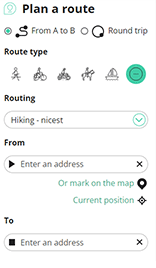

Meussenhof
In the eighteenth century, the Meusenhof was the largest farm in Cadier, especially if we take into account the associated lands. In 1735 the owner owned fifty pieces of land, meadow and forest in Cadier alone – not counting Keer – with a total area of more than 35 bunders. The farm itself, the yard, the garden and the meadow were more than three bunders in size. The Meusenhof was a winhof. This meant that the owner did not operate the farm himself and did not have his permanent place there, but leased the farm.
The living area and the commercial buildings of the Meusenhof are built around a closed courtyard. In South Limburg we still come across this architectural style a lot. The dung heap occupied a prominent place in the courtyard. Nowadays we turn our noses up at the stench, the flies and the vermin that an unhygienic dung heap brought with it. However, manure used to be of vital importance to the farm, for the farmer it was "gold".
The Meusenhof has an imposing high façade at the front and two large gates with black-painted sjaampsjtèin (scaffolding stones) to protect the facades from vehicles. About ten years ago, the current owners and residents, the Vaessen children, removed the ugly cement layer from the outer walls and the early eighteenth-century layer of bacon – briekke (bricks) interspersed with mellegerblök (marl blocks) – is visible again. In this way, the building regained its original appearance. This style of construction was used in the past because marl was cheaper than brick. The façades facing the courtyard are brick and half-timbered. On the east side there are still high and narrow windows in a wooden frame.
A number of dates can be found in the facades of the farmhouse. In the top of the façade of the house is the year 1715. In the keystone of the left elliptical arch gate we can still read ANNO. In the keystone of the right-hand gate is the year 1711. Underneath the gate passage is a door frame with ANO 1711 IHS barely legible on the lintel due to the many layers of lime. The older marlstone rear façade has an elliptical arched gate of brick with bluestone imposts and ditto keystone with 1713.
The farm was built at the beginning of the eighteenth century or has undergone a major renovation at that time. The year 1711 above the right-hand gate can be explained, because we know from old documents that the farm was considerably expanded in that year. Presumably, the original farmhouse was demolished and rebuilt.
In 1732, the possessions of the Meusenhof consisted almost entirely of arable land. In addition to the buildings, the vegetable garden and the house meadow (3ha, 76a) there was the Maat meadow of almost one ha south of the farm and the meadow called the Kamp at the end of the Dorpsstraat. The other 47 plots belonging to the Meusenhof were all used as arable land.
Source: Van Harte Eijsden Margraten
 Azure
Azure![]() | | Public | Danish • Dutch • French • German • Italian • Spanish
| | Public | Danish • Dutch • French • German • Italian • Spanish
Address: Kerkstraat 82, Cadier en Keer
Statistics
Select one of the most popular activities below or refine your search.
Discover the most beautiful and popular trails in the area, carefully bundled into appropriate selections.
Select one of the most popular categories below or be inspired by our selections.
Discover the most beautiful and popular attractions in the area, carefully bundled in appropriate selections.
With RouteYou, it's easy to create your own customised maps. Simply plot your route, add waypoints or nodes, add places of interest and places to eat and drink, and then easily share it with your family and friends.
Route planner

<iframe src="https://plugin.routeyou.com/poiviewer/free/?language=en&params.poi.id=2586590" width="100%" height="600" frameborder="0" allowfullscreen></iframe>
© 2006-2026 RouteYou - www.routeyou.com